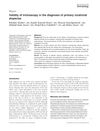Developing Patient-Reported Outcome Measure for Hair and Skin Disorders
August 2022
in “
medRxiv (Cold Spring Harbor Laboratory)
”
alopecia areata androgenic alopecia lichen planopilaris central centrifugal cicatricial alopecia sebopsoriasis hair disorders scalp disorders eyebrow disorders eyelash disorders beard-related skin disorders hair loss baldness scalp conditions eyebrow conditions eyelash conditions beard skin conditions

TLDR The goal is to create a tool for patients to report their experiences with various hair and scalp disorders.
This phase I study aims to develop a patient-reported outcome measure (PROM) for various hair disorders, including alopecia areata, androgenic alopecia, lichen planopilaris, central centrifugal cicatricial alopecia, and sebopsoriasis. The study will use thematic analysis of qualitative semi-structured interviews with patients aged 18 years and older. The interviews will focus on the patients' physical appearance, disease journey, treatment goals, physical symptoms, and psychosocial impact. The goal is to create a PROM that can be applied to a multitude of hair-related disorders. The study will continue until thematic saturation is reached, ensuring patient diversity in gender, race and ethnicity, age, and hair-related disorder. The study has been approved by the Brigham and Women’s Hospital Institutional Review Board.









